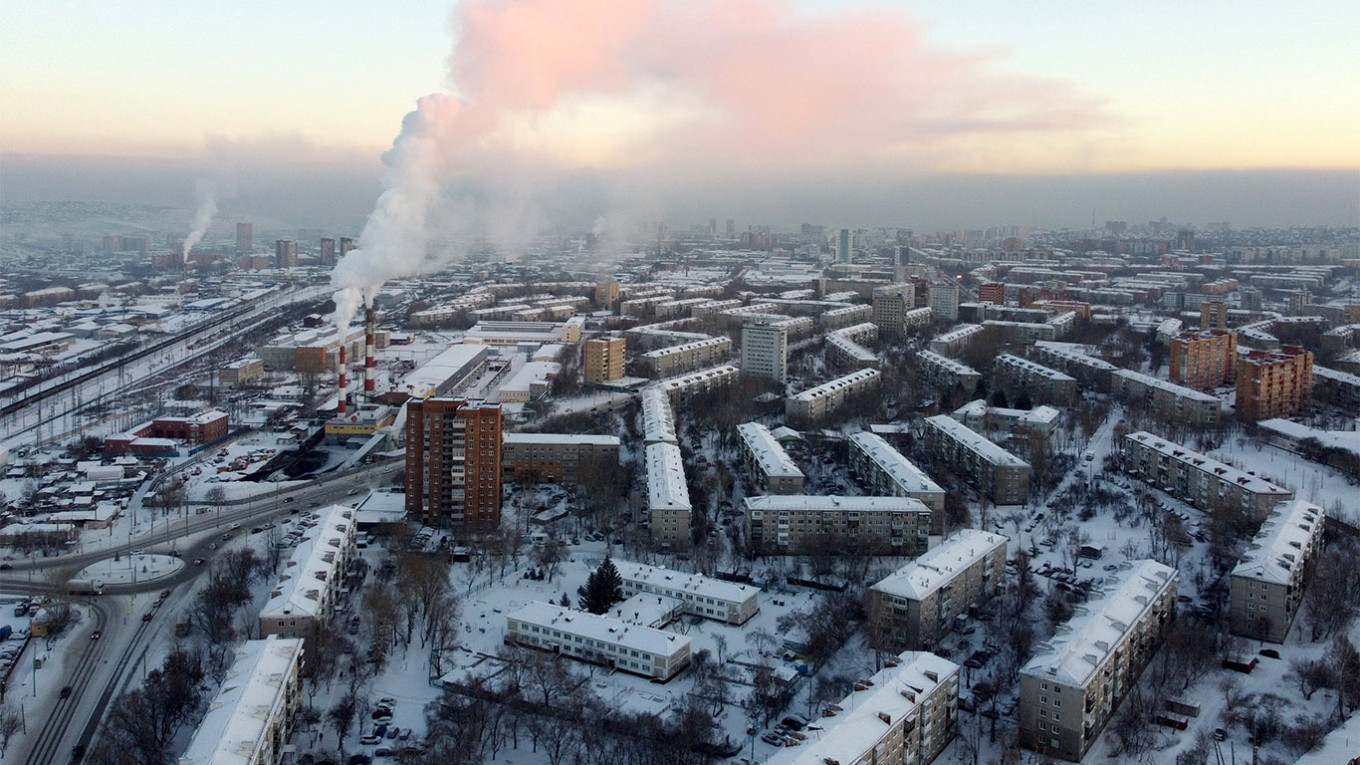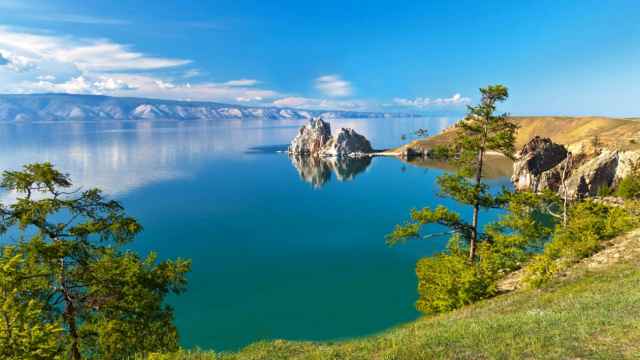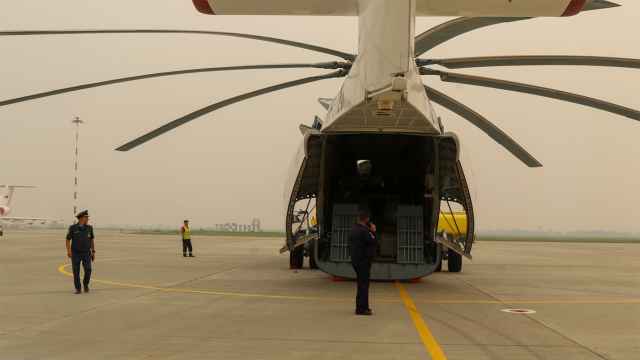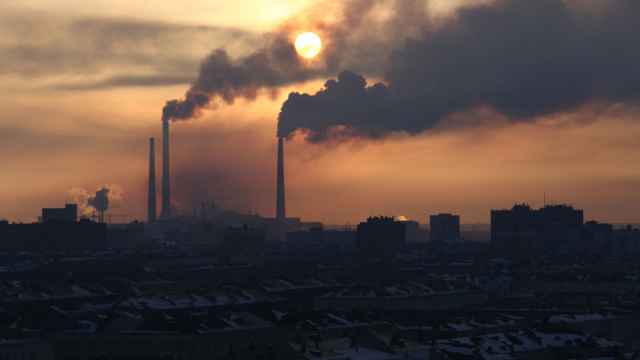"You can be at home, with all the windows closed, and suddenly you start to smell some kind of burning odor,” said Andrei Skovorodnikov-Erlikh, a resident of the Siberian city of Krasnoyarsk, of his city’s “black sky” alerts.
“When you look outside, everything is covered with a noticeable smog. By the second or third day — and this can last for a long time — your head just starts to ache terribly, and there is this constant sense of burning and fatigue."
In Krasnoyarsk, an industrial powerhouse over 3,300 kilometers east of Moscow, these “black sky” alerts — officially termed “unfavorable meteorological conditions” warnings — are a regular part of life.
“When you approach Krasnoyarsk, about 10 kilometers away, you suddenly start to sense this city's smell. You need to experience it once to understand it,” Skovorodnikov-Erlikh, 44, told The Moscow Times in a phone interview.
The “black sky” warning signals weather that impedes the dispersion of pollutants into the atmosphere, such as the absence of wind and precipitation.
Between the first alert in 2012 and the end of 2023, 1 million Krasnoyarsk residents have endured 460 of these smog-filled days. Over two weeks have been under this alert so far in 2024, with the latest coming earlier this month.
On days of heavy pollution, residents are advised to keep their windows shut and limit time spent outdoors.
But daily life must go on, leaving many with no real respite.
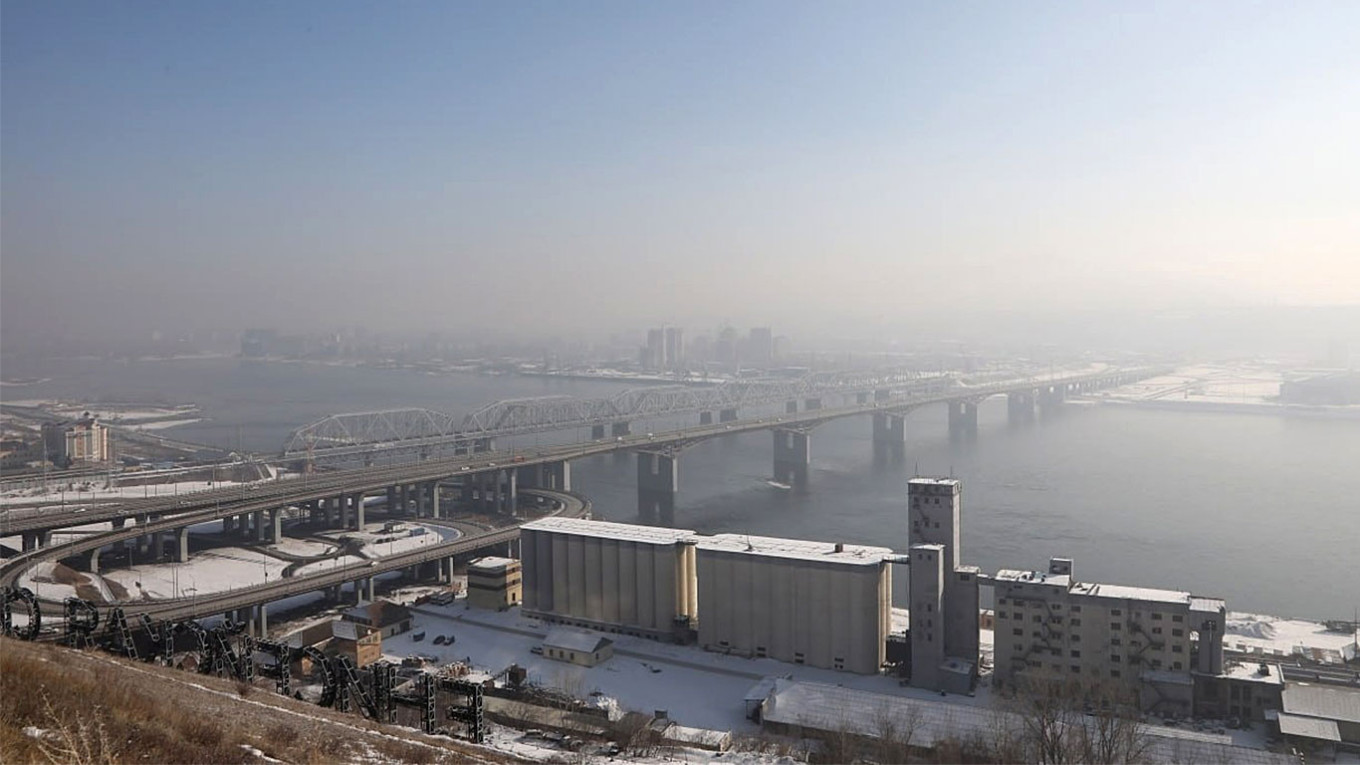
“I have been living in Krasnoyarsk since birth, and I am generally adapted to life here. But lately, even I cannot bear it,” a Krasnoyarsk resident told The Moscow Times.
“I developed a dry cough that doesn't respond to any treatment, and it comes and goes intermittently. And I don't smoke or drink," said the resident, who withheld her name due to the backlash she’s faced as a public activist.
Environmental laggard
In 2017, over 1,000 people took to the streets to protest the never-ending succession of darkened skies.
Krasnoyarsk-born Skovorodnikov-Erlikh, an organizer of those rallies, became a leader of the Za Chistoe Nebo (“For Clean Skies”) movement.
“Somewhere around 2015 to 2017 it became more noticeable, especially in winter, how everything in our city gets enveloped in chemical smog,” he said.
“That led to the formation of our public movement because certified ecologists, so to speak, only gathered for roundtable discussions and talked, but did nothing. Officials, too, only made promises."
Plagued by environmental issues for decades, Krasnoyarsk frequently ranks as one of Russia's most environmentally troubled cities. Official data indicates a "very high" level of air pollution with various toxic substances present.
On most days in January, independent air quality monitoring by citizens recorded elevated levels of PM2.5 — fine particles produced from the combustion of fossil fuels and biomass — far exceeding the limits considered safe.
Elsewhere in the Krasnoyarsk region, a heavily industrialized part of the country where Soviet-era machinery is still in use at some factories, residents are also no strangers to “black sky.”
In January, the industrial city of Achinsk, located about 150 kilometers west of the regional capital, became enveloped in gray snow, sparking a major environmental scandal across Russian Telegram channels.
According to the Esli Byt Tochnym data project, the Krasnoyarsk region, along with the neighboring Irkutsk region, had the worst air pollution in Russia in 2022.
Between 2015 to 2019, officials recorded a spike in new cases of respiratory diseases and malignant tumors linked to environmental factors, with Achinsk and Krasnoyarsk seeing the highest rates.
The geography of Krasnoyarsk, primarily situated in a valley surrounded by hills, traps emissions above the city, exacerbating the issue.
While authorities require local industries to temporarily reduce emissions during “black sky” periods, recent official inspections revealed non-compliance by some factories.
After the public outcry gained momentum through rallies and legal actions, it became possible to draw attention even from Moscow, Skovorodnikov-Erlikh said.
Yet according to residents, the problem remains unsolved seven years later.
Complicated picture
The air quality crisis in Krasnoyarsk has sparked debates about who is primarily responsible for it and, consequently, who should lead the efforts to improve the city's air quality.
Activists argue that authorities are unfairly attributing the pollution problem to private vehicles and stoves without adequately pressing major industries to filter their smokestacks.
If one looks at totals, the main bulk — over 80% — of emissions in Krasnoyarsk stem from industrial facilities, with aluminum giant Rusal’s Krasnoyarsk plant and three coal power plants cited as the main polluters.
Heating stoves in private houses burning coal and wood account for 14%, while road transport contributes just a few percent.
But the experience of an ordinary Krasnoyarsk resident who steps out of their high-rise building only to be confronted with a multitude of fossil fuel-powered vehicles tells a different story, climate and energy expert Vladimir Chuprov told The Moscow Times.
This resident would inhale mostly exhaust from cars being warmed up in the city’s yards or stuck in traffic jams, which becomes especially overwhelming during “black sky” periods when the air is stagnant.
“For example, if you are waiting at a bus stop and transport passes, then the primary source of pollution and all the aggravation comes from the vehicles,” Chuprov said. “In the background, you also have pollution from a power plant, yes. But if you consider it from a health perspective, transport can be just as crucial.”
The long-awaited construction of a city subway, which could have partly relieved the congestion problem, never materialized. The project's failure led to the arrest of a state official charged with embezzling funds allocated for its construction.
Without viable electric public transportation options, residents are forced to rely on buses and cars, the majority of which are powered by air-polluting fossil fuels.
Another culprit is the burning of coal — the fossil fuel with the highest emissions per unit of energy produced — at three major power plants and in household stoves.
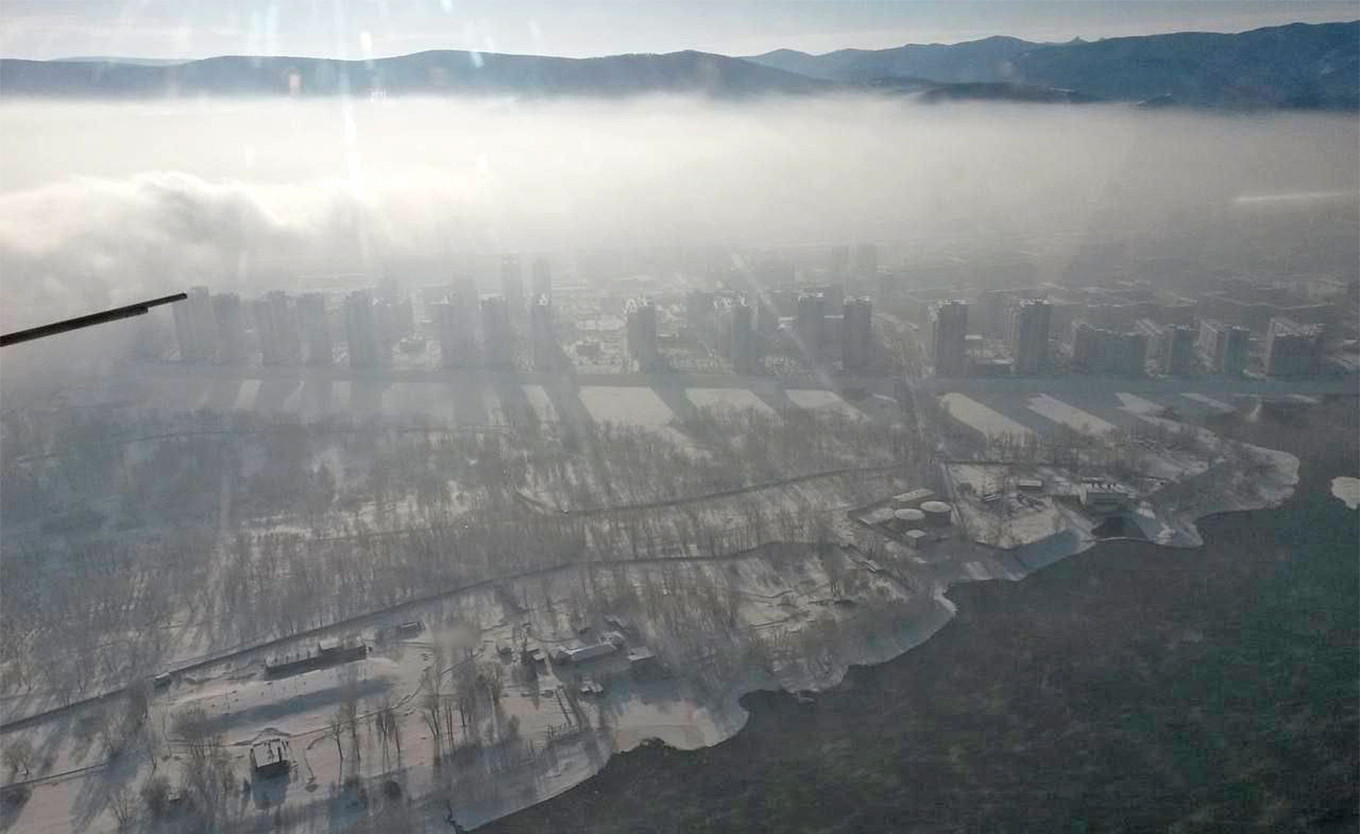
Unlike other Russian cities which get most of their power from natural gas, Krasnoyarsk opted for local coal decades ago when the city was developing due to a lack of nearby gas fields, Chuprov said.
“Laying a gas pipeline to Krasnoyarsk has always been considered to be costly,” he said.
“But the question is how to calculate. If we look at the overall impact, including extra sick days, the loss of health and regional gross domestic product, it turns out that the cost may be justified.”
Since joining the National Ecology Project in 2019, Krasnoyarsk has seen a 14% reduction in dangerous pollution emissions by the end of 2023 compared to 2017, the Natural Resources Ministry’s press service told The Moscow Times.
The ministry highlighted ongoing efforts to transition private houses from coal to more environmentally friendly heating options, with 193 houses already switched to gas heating between 2021 and 2023.
Krasnoyarsk has expanded its public transit network with 25 trams, 65 trolleybuses and 11 electric buses. The city has also replaced 31 inefficient coal boiler plants, the ministry said, contributing to the reduction in pollution.
In comments provided to The Moscow Times, Rusal’s press service pointed to several completed and ongoing projects aimed at reducing emissions at its Krasnoyarsk aluminum plant, such as a two-stage gas purification system and an AI tool monitoring uncontrolled emissions of pollutants.
"Environmental protection and reducing the impact of the company's operations on environment and climate are crucial aspects of Rusal's sustainable development strategy,” Rusal’s press service said.
“To minimize its environmental footprint and ensure efficient resource use, the company is undertaking modernization at its facilities, constructing new and refurbishing existing environmental sites.”
Seeking a solution
The complex mosaic of contributors to Krasnoyarsk’s air pollution makes it essential to tackle all of its sources, with each stakeholder needing to play a role, Chuprov said.
“The government needs to approach business, and businesses should understand what they will receive in return for the upgrade [of their technologies]. People should be ready to replace their private stoves.”
“This is a highly systemic problem where everyone needs to come together, and an arbiter is needed: the government,” Chuprov concluded.
While acknowledging some improvements, city residents haven't yet observed a significant positive change and are preparing a class-action lawsuit.
“Compared to six or seven years ago, there are fewer of these severe pollution days,” Skovorodnikov-Erlikh said. “However, it is still a significant burden on people's health. If before it was 'completely bad,' now it's just 'very bad'."
Defending the right to clean air has grown increasingly difficult in recent years. COVID-19 restrictions and current “draconian” laws have made protesting all but impossible, Skovorodnikov-Erlikh said.
After years of challenging the system through all available legal channels and achieving only modest results, many of those who formed the backbone of the protest movement have chosen to relocate elsewhere in Russia in search of a better living environment.
"Everyone talks about their children's health problems,” Skovorodnikov-Erlikh said. “I don't live in Krasnoyarsk right now because I'm fed up with suffering every winter, and my family is suffocating from the black sky.”
His family is staying outside the city until the winter pollution peak subsides and is considering the idea of leaving Krasnoyarsk once and for all.
“To those who asked me how to solve the black sky problem, I say: Guys, it's simple, find an environmentally friendly place and leave,” he said.
“If you have the opportunity, don’t wait and solve this problem for yourself."
A Message from The Moscow Times:
Dear readers,
We are facing unprecedented challenges. Russia's Prosecutor General's Office has designated The Moscow Times as an "undesirable" organization, criminalizing our work and putting our staff at risk of prosecution. This follows our earlier unjust labeling as a "foreign agent."
These actions are direct attempts to silence independent journalism in Russia. The authorities claim our work "discredits the decisions of the Russian leadership." We see things differently: we strive to provide accurate, unbiased reporting on Russia.
We, the journalists of The Moscow Times, refuse to be silenced. But to continue our work, we need your help.
Your support, no matter how small, makes a world of difference. If you can, please support us monthly starting from just $2. It's quick to set up, and every contribution makes a significant impact.
By supporting The Moscow Times, you're defending open, independent journalism in the face of repression. Thank you for standing with us.
Remind me later.


